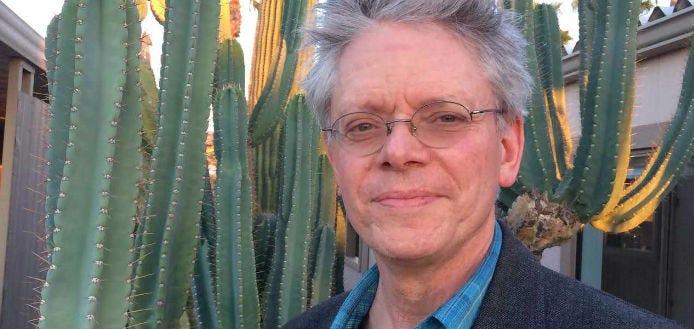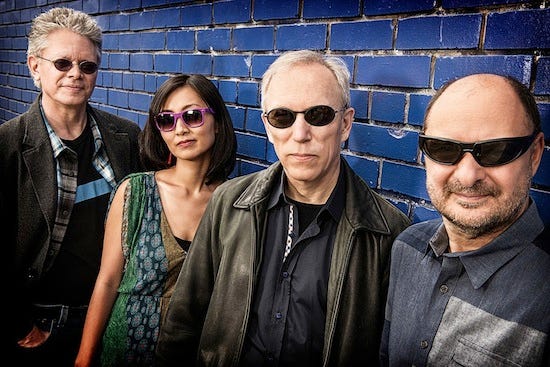David Harrington of Kronos Quartet: I Feel the Greatest Music Is Yet to Be Written
Interview
Welcome to Vintage Cafe, a reader-supported newsletter exploring music, film, books, art, travel, and coffee. By subscribing for just $6 a month, you support independent writing and unlock exclusive content.
The Kronos Quartet is one of the most renowned and influential ensembles in the world of classical music. In 2019, the quartet celebrated 45 years since its founding. In fact, they have defined this genre since their inception in 1973. What they are most known for is their exploration beyond the traditional boundaries of classical music, performing and recording with musicians from a wide array of genres including jazz, folk, and experimental music.
Over the years, the quartet has collaborated with jazz musicians like Thelonious Monk, Ron Carter, and John Zorn; with artists like Tom Waits, Kimmo Pohjonen; with classical composers such as Terry Riley, Philip Glass, Steve Reich, Henryk Górecki, Vladimir Martynov, Bryce Dessner, and Astor Piazzolla; and on film scores for directors like Darren Aronofsky (with Clint Mansell). They’ve also worked with musical traditions from Mali (Trio Da Kali), Iran, Tuva, and Vietnam. The list of collaborators is long but thoughtfully curated.
Among these partnerships is one with Laurie Anderson, with whom they created the album Landfall, which won a Grammy Award. The album was inspired by Hurricane Sandy and the impact it had on people’s awareness and the media hysteria it sparked. The hurricane flooded Anderson’s storage space, destroying memorabilia and old equipment she had preserved for years. In addition to this loss, the project was marked by the death of her longtime partner, musician Lou Reed, in 2013. Although his name isn’t mentioned anywhere, his presence is deeply felt in this work. The theme of loss is, thus, strongly woven into the album.
Another significant project is Fifty for the Future, an educational initiative unprecedented in the world of contemporary music. Kronos commissioned 50 new works from 25 female and 25 male composers worldwide, with the goal of making them accessible as a repertoire guide for young professional string quartets exploring 21st-century music. All scores and recordings are available for free, and Kronos performs at least one of these works at every concert.
I had the chance to speak with David Harrington, founder and artistic director of the Kronos Quartet, while they were performing in Wrocław, Poland in 2018. Open and warm, Harrington discussed the group’s enduring legacy, constant evolution, and the challenges they’ve embraced over the years.
Kronos Quartet
This year, the Kronos Quartet celebrated 45 years since its founding. What is the secret to the quartet’s longevity in these dynamic and ever-changing times?
I think one of the things we enjoy most is the rehearsal process, where it’s just us together with guest composers and performers. For instance, the other day, we performed in Moscow and had a wonderful rehearsal with composer Vladimir Martynov. We’ve been playing his music for many years, but this particular rehearsal was simply incredible. His music is part of the 50 for the Future project for Kronos. This was the first time he heard us perform these pieces.
Later, we played them during one of our concerts, and it’s such beautiful music—it’s part of what we do. I also spoke with him about performing at least one more major piece that he might compose for us. I can also tell you that last night I received a call from Terry Riley, and we talked about new projects as well.
I think what sustains this group is the music itself. We genuinely enjoy it and draw a great deal of energy not only from the music but also from so many young performers around the world. The 50 for the Future project rejuvenates the Kronos Quartet in a wonderful way.
How has the quartet managed to keep its music fresh and relevant all these years, with so many collaborators involved?
First of all, I feel like the greatest music has yet to be written. That’s something for the future. Music is something that grows and leads to the next experience. It’s an unfinished human story. It’s perpetually unfinished, and for all of us who decided very early in life that we wanted to be musicians, it doesn’t mean we know more about music than others. It means we’ve realized that we can’t live without it, that we want to be surrounded by it as much as possible.
Keep reading with a 7-day free trial
Subscribe to Vintage Cafe to keep reading this post and get 7 days of free access to the full post archives.






